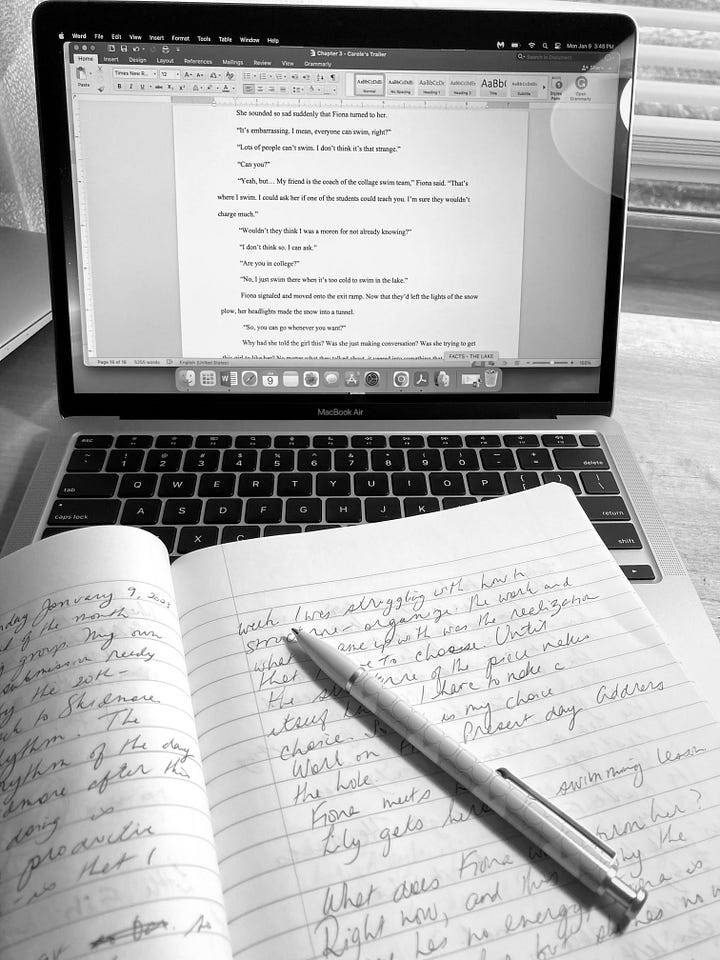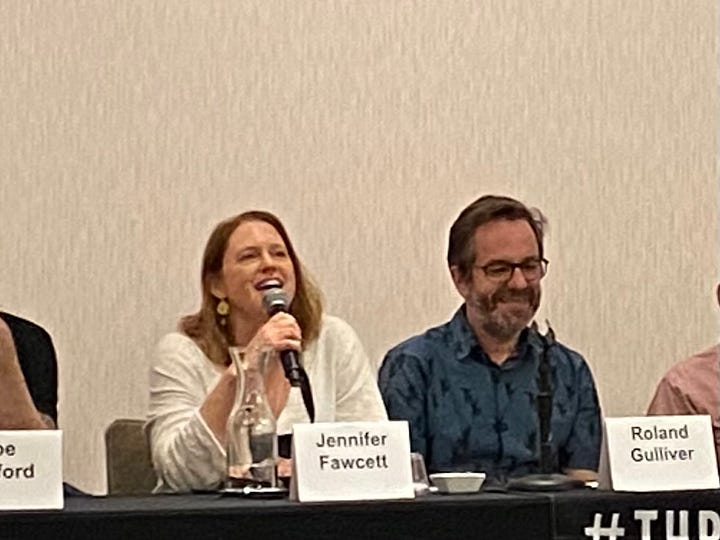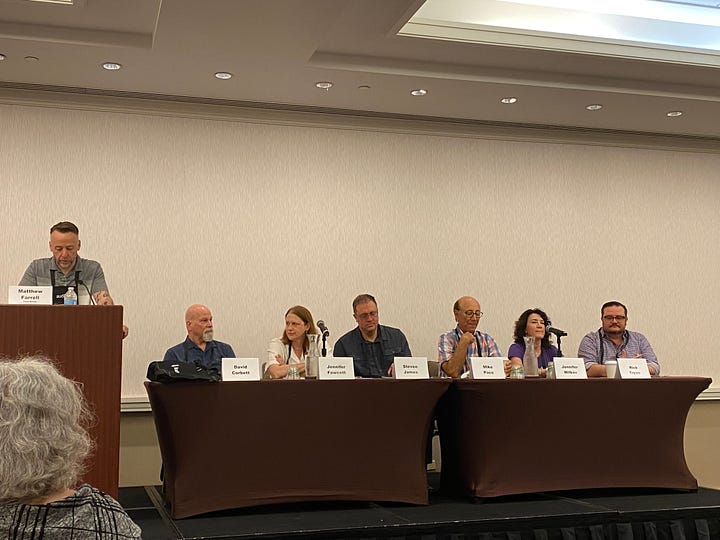

For thriller writers, it’s that time of year: ThrillerFest is happening this week. The preceeding “Fests” are already happening and my social media feed is starting to fill with pictures of authors gathered together, arms around each other under the unflattering lighting that seems ubiquitous to hotel conference rooms. The lighting aside, those authors look genuinely happy to be there, and I’m really looking forward to joining them.
This will be my third ThrillerFest. The first time I went, I didn’t know anyone. The conference kicks off with a MASSIVE cocktail party. Walking into a room of 1000+ writers (who all seemed to know each other - I know they didn’t, it just seemed that way) was very intimidating for an introvert like me, but I quickly met people and meeting those people led to meeting more people, and now going to ThrillerFest is like returning to summer camp.
Summer camp with cocktails. And books. And authors whose names you’ve previously only seen on a book cover. And more cocktails.
In other words, it’s a lot of fun.


For those who don’t know, ThrillerFest is an annual convention put on by International Thriller Writers. It happens each June in NYC and attracts best-selling authors, debut authors, want-to-be authors, agents, editors, and people who love the many iterations of “thriller” books. There are panels on subjects ranging from writing craft to audiobooks to how to get an agent to marketing. There are also celebrity guest authors who get interviewed in a long-form style (i.e. for an hour and by someone who asks savvy questions and knows their work intimately) that gives the audience a chance to do a deep dive into their processes. In the days before ThrillerFest, there’s CraftFest, Master Class, PitchFest, QueryFest, and this year, they had a special day dedicated to learning FBI and ATF investigation methods.
I learned about ThrillerFest only a week before I attended the first time, so it was a scramble and I missed out on some good opportunities. If I had known about it before before my book came out, I could have learned more about the industry I was about to join and made more connections with authors who were on the same journey I was. So, that’s why I’m posting about it here, in the hopes that someone who doesn’t know about it can learn.
And, if you are an introverted person, if you are new to all of this book stuff, if you’re like me and look at all those names and all those credits and think, “I’ll never fit in there,” then I’m writing this to say that you can fit in there. The vast majority of people I’ve met in this industry, at this conference and others, are kind and approachable and happy to meet someone who is just starting out.
There’s no getting around the fact that festivals like this cost money. That’s a lot of money between conference fees, hotels, travel, and meals. So, while I’m talking about ThrillerFest here, it’s not the be all and end all. Many cities and towns also host book festivals—I’ll post more about the ones I’m going to as they arise— and these are usually free for the community and (if you find one nearby) easier to get to, and they still offer opportunities to make meaningful connections with other authors and readers.
Networking is a gross word. It’s the “working” part that I am reacting to because it feels schmoozy and disingenuous. Instead, I’d rather focus on the “net” part of that word. A net like something to hold you, to connect you to others. That is ultimately why I push myself out of my comfortable writing cave.
Writing can be a lonely business, whether you’re published or not. I can scroll social media and it seems like everyone else is doing so much better, like everyone else has figured out how to do it “right.” It’s only through making real connections with others in this industry that I know I’m not alone.
The best thing—really the only thing—writers at conferences can give to each other is community. We can’t get each other published, or reviewed, or on the NYT bestsellers list. But other writers can understand what you’re going through, the ups and downs, the public wins and the private losses. They can understand that gnawing in your gut of “will it ever happen for me?” The difference that can make in your mental well being is … HUGE.
Maybe this seems too obvious to bother posting about. Maybe I’m posting this more for me, as I pack my bags for another ThrillerFest and get ready to do it again.
A sneak-peak of my panel
I’m on a panel called Lights, Camera, Action: Filmworthy Writing. It’s happening on Friday 6/20 from 4:50 - 5:40 with a book signing to follow.
Why am I on this panel? My first book, Beneath the Stairs, was optioned for television by Black Bear Pictures (they’re the folks who made Dumb Money, The Marsh King’s Daughter, and a whole lotta other film and TV).
I’m going to do a deeper dive on the ins and outs of what getting your book optioned for film or TV means in a later post. For this one, I’d thought I’d focus on a question that I’ve been told I’ll be asked on the panel. (This is my chance to warm up, thank you Jon the moderator, who sent the questions in advance.)
The question: Do film/TV people favor books that are based on true stories?
Answer: It’s not a make or break, but it can help. Why?
With a true story, there’s something exciting about knowing that this actually happened. But it has to have a great hook.
In the case of my next book, Keep This for Me, the true story part of it has an excellent hook: father and son serial killers.
(A little background: I learned about this story back in 2003 when the son was arrested. What police discovered was a copy-cat quality to what he was doing with what his father had done several decades before. There was a lot of speculation about whether this sort of behavior could be genetic. I’m not sure that’s been answered scientifically, but even if it isn’t genetic, it seems to me that if this was in your family, you would wonder, is it in me, too?)
With some true stories, there’s also existing I.P. (Intellectual Property). Books can be optioned, but so can podcasts, newspaper articles, magazine stories, etc. Existing I.P. has the possibility of a built-in audience. In film and TV, the finances are always in the forefront. It’s part of the reality of that industry because they cost a lot to produce, so if there is the possibility of an existing audience, it can be enticing to producers whose jobs may be on the line if they push a certain project forward. True crime draws a broad audience and so producers would be hoping to tap into that.
Did I miss anything?
If there’s another reason why you think Hollywood is drawn to stories based on real events, let me know in the comments. I promise to thank you during my panel.
And if you’re going to be at ThrillerFest, please, say hello. I’ll be the one looking excited (to be there), and nervous (for reasons expressed above), and I will be very glad to meet you.





I was there, too, Jennifer, and everything you say about the “net” and social importance of events like these is spot on. If someone’s on the fence about going, but is truly committed to a career, conferences are a must. If only to make friends and remind yourself you’re not alone.
This is a fantastic post, wonderful insights on attending writers conferences in general. And regarding ThrillerFest, which is underway right now — hope you are having a great time, and good luck with your panel!